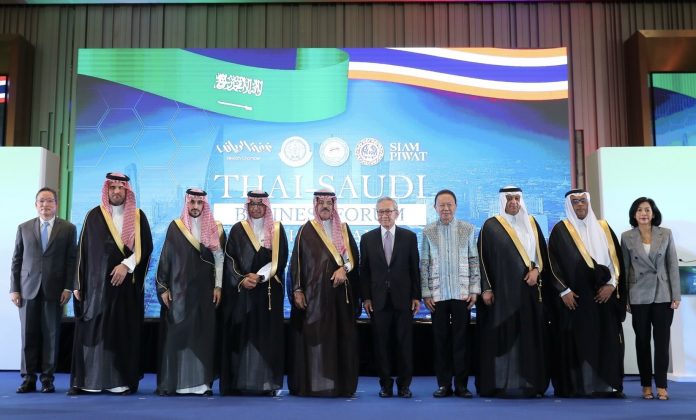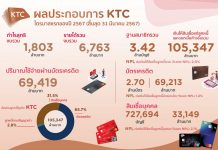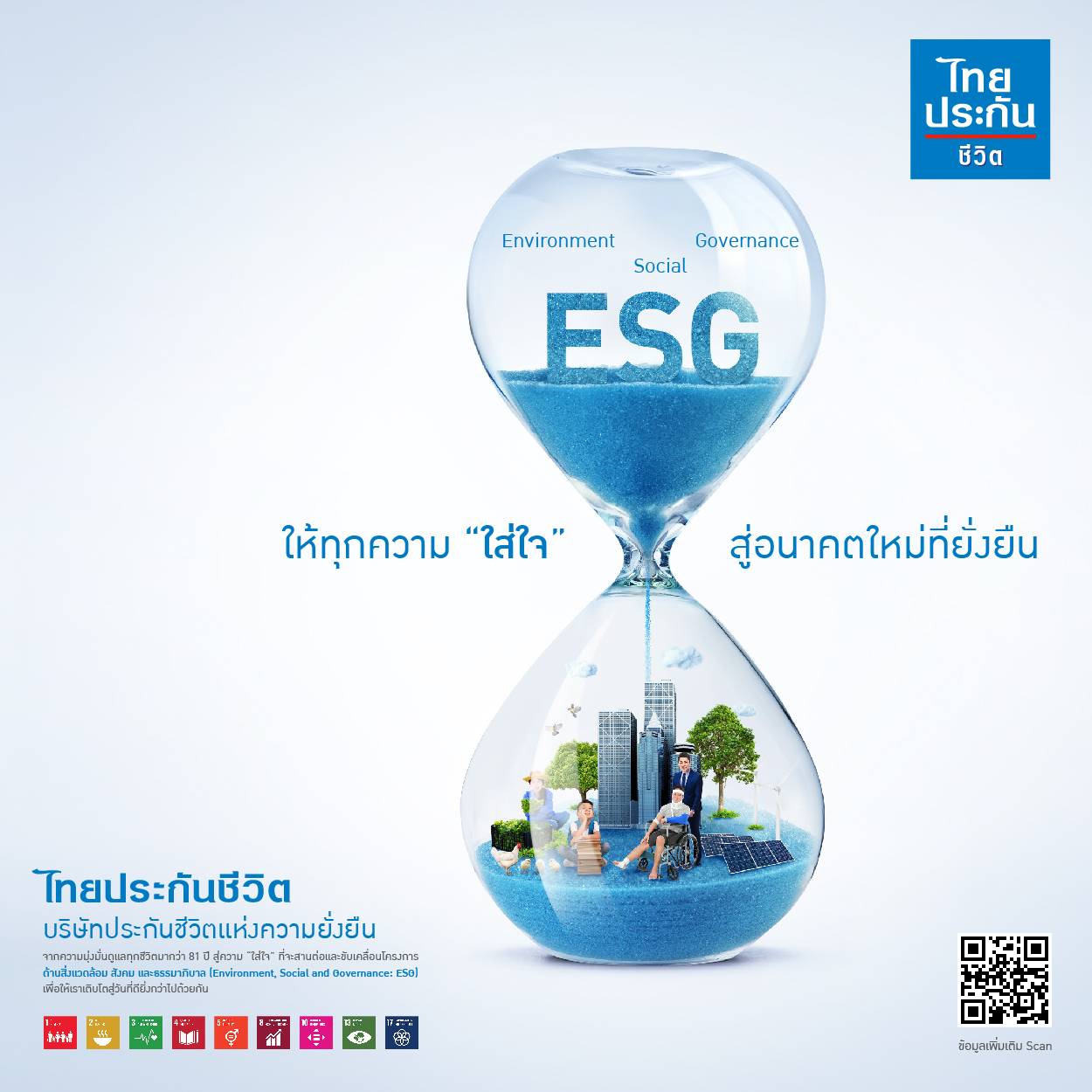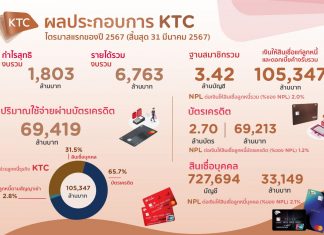สมาคมธนาคารไทย ตอกย้ำบทบาทธนาคารพาณิชย์หนุนการค้าระหว่างประเทศ เดินหน้าพัฒนาโครงสร้างพื้นฐานดิจิทัล ยกระดับธุรกรรมการค้าระหว่างไทย-ซาอุดิอาระเบีย ชู “2 โครงการ” เพิ่มขีดความสามารถแข่งขันให้ธุรกิจ นำเข้า-ส่งออกของไทย

นายผยง ศรีวณิช ประธานสมาคมธนาคารไทย เปิดเผยถึงการพัฒนาโครงสร้างพื้นฐานและบริการทางการเงิน หรือ Financial Facility & Service ในงานสัมมนา “Thai-Saudi Business Forum” ซึ่งมีภาคธุรกิจไทยและซาอุดิอาระเบียเข้ารับฟังกว่า 200 คน ณ ศูนย์การค้าไอคอนสยาม เมื่อวันที่ 6 กรกฎาคม 2565 ว่า ภาคธนาคารไทยให้ความสำคัญกับพัฒนาโครงสร้างพื้นฐานด้านดิจิทัล เพื่อยกระดับการให้บริการเกี่ยวกับธุรกรรมการค้า ให้เกิดการเชื่อมโยงการเงินและการค้าแบบไร้รอยต่อ เพื่อส่งเสริมการค้าระหว่างประเทศให้เติบโตอย่างต่อเนื่อง โดยมีโครงการสำคัญ คือ

1.โครงการ Smart Financial and Payment Infrastructure for Business เพื่อพัฒนาโครงสร้างพื้นด้านการเงินดิจิทัลแบบครบวงจรของประเทศ ทำให้เกิดเชื่อมโยงข้อมูลธุรกรรมการค้า การชำระเงิน และภาษีบนระบบออนไลน์ เปลี่ยนจากการค้าแบบใช้เอกสารกระดาษเป็นใช้ระบบดิจิทัล เช่น บริการ e-Invoice e-Tax Invoice และ e-Payment for Business เพื่อลดค่าใช้จ่ายและเพิ่มประสิทธิภาพการทำธุรกรรม รวมทั้งเป็นการสร้าง Digital Footprint เพิ่มโอกาสการเข้าถึงแหล่งเงินทุนของภาคธุรกิจด้วยต้นทุนที่เหมาะสม นำทางไปสู่การพัฒนา Digital Supply Chain Financing และการนำข้อมูลการค้าและการชำระเงินดิจิทัลมาใช้ เพื่อลดความเหลื่อมล้ำในการเข้าถึงบริการทางการเงิน
2.โครงการ National Digital Trade Platform (NDTP) เป็นความร่วมมือระหว่างหน่วยงานรัฐและเอกชนในการพัฒนาแพลตฟอร์ม เพื่ออำนวยความสะดวกให้กับการนำเข้าและส่งออกของประเทศ โดยบูรณาการข้อมูลธุรกรรมที่เกี่ยวทั้งหมด นำ e-Document มาใช้เพื่อลดการใช้เอกสารที่เป็นกระดาษ เชื่อมต่อกับระบบ National Single Window (NSW) และแพลตฟอร์มการค้าต่างประเทศอื่นๆ ซึ่งปัจจุบันเชื่อมต่อกับ แพลตฟอร์มการค้าของประเทศญี่ปุ่น และสิงคโปร์ และมีแผนที่จะเชื่อมต่อไปยังประเทศในยุโรป และตะวันออกกลางในอนาคต เพื่อช่วยอำนวยความสะดวกให้กับผู้นำเข้าและส่งออก เพิ่มประสิทธิภาพ ความโปร่งใส เพิ่มขีดความสามารถทางการแข่งขัน และสร้างโอกาสใหม่ๆในเวทีการค้าระหว่างประเทศให้กับผู้ประกอบการไทย
ทั้งนี้ ปัจจุบันธนาคารพาณิชย์มีบทบาทสำคัญต่อการค้าระหว่างประเทศ มีบริการหลากหลาย ครอบคลุม ทั้งการโอนเงินระหว่างประเทศ การเรียกเก็บเงิน, เอกสารยืนยันการชำระเงินในการซื้อขายสินค้า(Letter of Credit) และการจัดเตรียมเอกสาร เป็นต้น นอกจากนี้ ธนาคารยังมีช่องทางออนไลน์สำหรับทำธุรกรรมการค้าระหว่างประเทศที่สะดวก ทั้งบริการสินเชื่อการค้าต่างประเทศ (Trade Finance) และบริการด้านเอกสาร โดยในปี 2564 ธนาคารพาณิชย์ทั้งระบบมีธุรกรรมเงินตราต่างประเทศกับลูกค้าทั้งในไทยและในต่างประเทศกว่า 1.7 ล้านล้านเหรียญสหรัฐฯ แสดงให้เห็นว่าเป็นตลาดที่มีสภาพคล่องสูง โดยเป็นธุรกรรมของธนาคารพาณิชย์ในไทยสูงถึง 65% เป็นธุรกรรมของสาขาของธนาคารต่างประเทศ 35% ของจำนวนธุรกรรมทั้งหมด สะท้อนถึงบทบาทที่สำคัญต่อธุรกรรมการค้าระหว่างประเทศ
นอกจากนี้ ธนาคารพาณิชย์ของไทย เป็นผู้เล่นหลักในระบบการเงินของไทย มีสินทรัพย์รวมคิดเป็น 92% ของสินทรัพย์รวมของระบบธนาคาร โดยธนาคารพาณิชย์ขนาดใหญ่ 6 อันดับแรกของไทยมีสินทรัพย์รวมกัน 537 พันล้านเหรียญสหรัฐ หรือประมาณ 79% ของทั้งระบบ ธนาคารไทยมีฐานะทางการเงินที่แข็งแกร่ง เห็นได้จาก Credit Rating ของธนาคารขนาดใหญ่ 6 อันดับแรกในไทยได้รับ Credit Rating ในกลุ่มระดับลงทุน (Investment Grade) จาก 3 หน่วยงานจัดอันดับความน่าเชื่อถือชั้นนำ
“ระบบธนาคารพาณิชย์ รวมถึงระเบียบกฎเกณฑ์ของไทย เอื้อต่อการทำการค้าระหว่างประเทศมากขึ้น โดยที่ผ่านมาประเทศไทยได้ปรับปรุงกฎระเบียบ เพื่อเปิดกว้างสำหรับการทำธุรกรรมเงินตราต่างประเทศ ไม่จำกัดเฉพาะธุรกรรมที่เกี่ยวกับการป้องกันความเสี่ยง (hedging) อีกทั้งกฎระเบียบใหม่ยังอนุญาตให้บริษัทสามารถทำธุรกรรมเงินตราต่างประเทศได้โดยใช้เอกสารประกอบน้อยลง ซึ่งเชื่อว่าจะสนับสนุนให้การค้าระหว่างไทย-ซาอุฯให้เติบโตอย่างแข็งแกร่งในอนาคต”
TBA boasts two projects to boost competitiveness of Thai importers and exporters, enhance Thai-Saudi trades and support economic growth
Thai Bankers’ Association (TBA) highlights the prominent role of commercial banks in supporting international trade and the aim to upgrade trade transactions between Thailand and Saudi Arabia with 2 projects that will improve competitiveness of Thai importers and exporters.
Payong Srivanich, the chairman of the Thai Bankers’ Association (TBA), gave an overview of the development of Thailand’s financial facilities and services at the Thai-Saudi Business Forum, attended by over 200 Thai and Saudi businesspeople, at ICONSIAM on 6th July 2022, stating that Thai banks place high importance on the development of digital infrastructure in order to upgrade trade transaction services, enable seamless linking of trade and financial data and promote continuous growth of international trade. Two major projects that will enhance trades are:
- Smart Financial and Payment Infrastructure for Business, which aims at developing the country’s digital financial infrastructure by enabling end-to-end digital business and linking data on business transactions, payments and tax. It involves moving from paper-based trading to a digital system, covering e-invoices, e-tax invoices and e-payments for businesses. This aims to reduce costs, improve efficiency, and create digital footprints to improve access to funding at reasonable costs. As a result, the project will pave the way for digital supply chain financing and the utilization of digital trade and payment data to improve financial inclusion.
- National Digital Trade Platform (NDTP), which is a collaboration between relevant public and private entities to develop a platform that facilitates export and import procedures by integrating all transaction data and utilizing e-Document to reduce paper handling. NDTP can be connected to the National Single Window (NSW) and foreign digital trade platforms. Currently, it is connected to Japan’s and Singapore’s trade platforms, and it plans to expand connectivity to other countries in Europe and the Middle East. The platform will bring greater convenience to importers and exporters, as well as improved efficiency and transparency. It will also boost competitiveness and uncover new opportunities for Thai businesses.
At present, commercial banks play a major role in international trades as they provide a wide range of services such as remittance, collection, letter of credit and document preparation. They also have convenient online channels which provide access to trade finance solutions and document submission. In 2021, foreign exchange transactions of commercial banks totaled over USD 1,709 billion, showing the high liquidity of the market. Commercial banks registered in Thailand accounted for 65% of the total transactions while foreign bank branches shared the other 35%, reflecting Thai commercial banks’ prominent role in international trade.
Moreover, commercial banks are key players in the Thai financial system, having 92% of the Thai banking system’s total assets. Assets of the 6 largest commercial banks registered in Thailand total USD 537 billion, accounting for 79% of the market. Thai banks also have strong financial positions as the country’s 6 largest banks receive investment grade ratings from all three major credit rating agencies.
“Commercial banks, as well as Thai regulations, are now more conducive to international trades. Thailand has made adjustments to regulations to expand the scope of foreign exchange transactions beyond hedging transactions. The new regulations now allow companies to conduct foreign exchange transactions with fewer documents. We believe that these improvements will further promote growth in international trade between Thailand and Saudi Arabia.”
Thai Bankers’ Association





























































